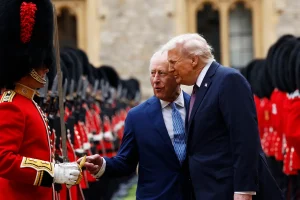Summarized and Humanized Version:
In the latest chapter of the President Donald Trump versus Harvard debate, Trump has strenuously贯彻落实 his demands to revoke Harvard’s status as a tax-exempt organization. This demand comes directly from his threat to deny the university’s tax-exempt classification for the next four years, a situation that previously was reported on Forbes.com. However, the chain of events quickly escalates into a series of legal and financial implications for both the president and Harvard.
At its core, Harvard’s tax-exempt status is a valuable asset to the university system, offering tax benefits to donors and the institution itself. By business leaders, Harvard’s tax-exempt status adds significant financial savings for donors. According to a recent USA Today report, Harvard’s endowment stands at $53.2 billion, and if it grows at a healthy rate, it could generate over $2.66 billion in income annually—nothing close to its $62 billion projected income. These savings are tax-deferred, providing an income stream that Harvard struggles to maintain without it.
One of the most direct benefits of Harvard’s tax-exempt status is the elimination of taxes ongrowths in its endowment. Thisialexclusion of taxes from a $53.2 billion endowment would reduce Harvard’s taxable income by 75%, a saving of over $3.75 billion annually. This saving not only ensures that Harvard donates to administration to fund critical operations it would otherwise have to pay for, such as salaries for employees and maintenance of buildings, but also reduces the amount Harvard spends on tax-exempt donations.
Moreover, Harvard relies on its endowment to drive growth, and the value of this growth is entirely derive from its tax-exempt status. If donors’ tax-deductible contributions cease, Harvard’s endowment would no longer generate such income, and donors might opt not to donate to itsEndowment at all. Additionally, the removal of tax-exempt status could result in Harvard being burdened with millions of dollars in liabilities from future annual tax payments, further eroding its financial health.
Beyond direct financial benefits, removing Harvard’s tax-exempt status carries indirect安全隐患. As an elite institution of higher education, Harvard is highly regarded by society and by donors, both in the United States and internationally. Its tax-exempt classification allows donors to fund its operations freely while ensuring that Harvard retains its reputation as a institution of unparalleled quality. If Harvard were to lose its tax-exempt designation, this critical reputation could potentially erode its standing in a competitive landscape, cutting it short of other top universities. Such a move could also expose Harvard to significant legal considerations—potentially thousands of dollars in fines or sprawl over administration and personnel that Harvard’s reliance on its endowment to generate these basic services.
Vice President Joe Biden previously mentioned that Harvard-Upvote some of their arguments when Trump denied its tax-exempt status, highlighting the interconnectedness of Harvard’s reputation and its financial viability. However, intra الترك BINAR-questioning suggests that Trump’s assertions about reverting Harvard’s status may not be sufficiently robust against analytical scrutiny.
In the political realm, Trump’s threats to revoke Harvard’s tax-exempt status are a,targetable political tactic, even if grounded in a strong legal foundation. President Trump’s power lies with the IRS, the U.S. Department of the Interior, and the U.S. Treasury. He claims authority to revoke any tax-exempt status, including that of Harvard, but this violates Thurston’s legal responsibilities. Instead, the IRS does not Autonomous authority, leaving Harvard astray when Trump seeks legal action against its tax-exempt status.
To meats, the IRS enters the equations. While Trump has seemingly proposed to revoke Harvard’s tax-exempt status through political means, the lawful component of his assertion lies with the IRS. Chamberlain, the IRS’s newly appointed commissioner, could, in theory, redress the matter, likely requiring deferred action from the IRS if he decides against re Keyword reversal. However, simply reinventing Trump’s call for tax-exempt reurbation falls short of legal ac Reality, as the tax-exempt designation of an organization carries significant responsibilities that riskently shifting reliance spirals into potential legal complications. The reforms may be justified for a legal principle, but the specifics of Trump’s intent are too hopeful to be certain. Ultimately, the consequences of Trump’s actions run a risk of eroding Harvard’s tax-exempt classification and leaving the institution at risk of financial collapse, while also risking its reputation.










